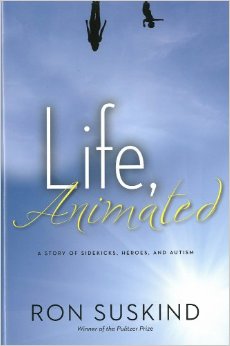|
Here are this weeks questions answered!! Keep them coming!!! The boys are loving this and we have a new participant joining us next week who will be able to chime in on the female perspective!!! Stay tuned!!! Question: Has anyone ever doubted the "authenticity" of your typing and how did you (or others) convince them it was you? KEIR I stay very focused on my own journey and dont care about whether people believe its me or not. People who believe its me get to know me well. People that dont believe its me will never get to know the real me and i am not interested in wasting my time convincing them of something they refuse to see. I am keir a person worth your time but if you doubt its me you are not worth my time. I have lots to accomplish but no time to waste. JEFF There will always be doubters and skeptics but we just need to keep doing what we are doing teaching people about presumed competence and spreading the word and knowledge of FC. We can only continue doing what we are doing and forget the ignorance of others. It's fear of the unknown and they are cowards. Question: How do you define a successful life? KEIR I consider my life successful. I have a family a school and friends. I communicate i am a person with thoughts and feelings that are very important to me. My thoughts about success are very different than many peoples thoughts. I define success as happiness and safety to feel content. I have both so my life is successful. You might define it differently but that is how i see it.just dont put to much emphasis on money it does not define success and might make you miss true success. JEFF A successful life is different for every person and manifests in different ways but I think the commonality is happiness,. Happiness comes in many forms like material possessions, relationships etc but successful happiness must come from within your soul and only you can be the judge of that. Please note the answers to the questions have been typed by the students and have not been altered, edited or reformatted in anyway. These are their genuine thoughts and responses.
We'd love to hear from you! If you would like to ask a question, please comment to this blog post, post to our Facebook page or send an email to jhammond@celebratethechildren.org.
0 Comments
 “…they can’t express it but it doesn’t mean it’s not there. They often live very rich lives inside there, if you can get in there with them, you can discover that.” Ron Suskind Ron Suskind, Pulitzer Prize winning author, does an amazing job explaining the big picture concept of developmental approach (affinity) therapy as he shares his very personal story of his family and his son with autism. Watch the exclusive interview with Jon Stewart! We received so much feedback from Jeff and Keir's first post, they were THRILLED to see that their first message reached as far as Illinois, Washington and even WALES!!! This week, the first question chosen was from a CTC staff member...Question: From your perspective in observing and interacting with the verbal world at large, what do you view as the greatest disadvantage, if any, of having and using language? JEFF I think that we in general feel that speech is really for people who speak. Usually it really does not matter to us but it matters to speakers. please understand that we would like to have communication with you but we do not need spoken word with each other. i think that one of downfalls of spoken word is that people don't spend enough time listening. Mostly I notice people just answering without really thinking about the answer. only people who really care about the answer listen. KEIR I think there are advantages and disadvantages to both verbal and nonverbal communications but the main disadvantage is taking it for granted. Having a voice and not using it is the most wasteful and neglectful thing ever. It is so easy to for verbal people to voice opinions yet most stay so silent. Have and opinion. Fight fro something you believe in. Use the gift god gave you and make a difference. I do my best with what I have. You do a little with the lot god gave you. The second question chosen was from the comment below that came from our website from a non-CTC staff member all the way from Washington state!!Question: "You both got me thinking, Can animals abuse the earth? I am sure there are times when animals feel fear too. What exactly is abuse of the planet?" JEFF I am sure there are times when animals feel fear too. Animals have instinctive approaches to the earth. There only is greed by mankind. The bad intentions of man are what create abuse of Mother Earth. Animals do not have greed. Animals fear the predator but again it is instinctual. KEIR Animals do not abuse the earth because they live off the earth so it is pertinent for their survival. They may so called abuse each other but it is their animal instincts of survival kicking in. Abuse of the planet is a disregard for what gives us sustenance and a home. Without it we are nothing. Please note the answers to the questions have been typed by the students and have not been altered, edited or reformatted in anyway. These are their genuine thoughts and responses.
 Celebrate the Children students Keir and Jeff participate in an after school program that gives them an opportunity to chat via Facilitated Communication. After brain storming ideas of how they would like the group to be formatted, they decided they would like to answer questions from the CTC community (and beyond!). Some of their thoughts include: Jeff: thoughts from our point of view will be food for thought of something profound Keir: questions from unknowing staff will be the greatest way to teach Jeff: what to write is what the readers want Keir: please get this message to the people of ctc KEIR's INPUT ABOUT THE KINDS OF QUESTIONS HE LIKES: I like questions that are expansive in thinking not questions that are easily answered. Maybe questions that could have many possible answers.questions that force people to look beyond surface beliefs that they talk about without thinking. The first round of questions…Question: What is your advice for students and staff who struggle with FC? KEIR I would say that if you are struggling with fc be patient and understanding it takes a long time to learn. Many people think typing with a new facilitator should be easy but it is one of the hardest things i have ever had to do. It is like learning something as difficult as asking a girl out i dont think i will evr figure that out but i imagine it would be hard to learn for most people not just me. So you understand it takes time and ptience but is worth every minute you give for practice to us who depend on your perserverence to help us communicate. If you give up we have no hope. Please keep trying it is important for us.critical too or we have no place to be heard. Thank you for being our greatest support even when it is hard. Quit complaining because it is not woking it will work but we need to practice together. Being a nonverbal student leaves us at your mercy please remember that and be strong for us. Thank you. JEFF FC is such a popular topic. Here are some tips I have First, FC is the most challenging and rewarding gift to child with no voice. It is exhausting so allow breaks for those starting off. Use the ladder of communication moving up and down as needed. Practice whenever you can and use the students passions as motivating topics. As for staff, patience is key. Our brains think fast but bodies slow. Also staff overthink everything so r e l a x. There will always be skeptics for everything but as long as you know the truth we prevail. Typing allows us to show intelligence where others thought there was none. Question: I once heard a person on the radio say that they felt that humans abuse the earth, other humans and animals, because they "fear pain"... Any comments? KEIR humans are fearful by nature. We are fearful of things we dont understand i think people act out in fear to protect themselves not from just pain but from ridicule. Being mean and degrading is easier than being open to ideas that oppose your beliefs. They find it easier to dismiss the blatant truth than to accept that they may be wrong. It is easier to harm things that have no defense so that they may feel superior and revered by their peers. What it shows is their weakness and unaccepting attitudes towrds things and people they feel are inferior. I feel sorrow for them they need our compassion to help them learn to approach life with love not fear or hate i want this message to be spread through the world but i will start with ctc. And want people to honestly look at their approach to life. Decide if you choose fear or love. You might be surprised if you are truthful to yourself. Think more about helping yourself with this because it will help your approach to all living things including us. I am thakfful for your questions and hope you send more. My mind is full of things to share if you just ask. JEFF People fear the unknown so the fact that we do not fully understand animals or other humans thoughts or actions is a huge concern for the people of the world we live in. People want control so no control of any situation is an uncomfortable place to be but we need to remember we can all coexist harmoniously or we wouldn't have been put In the same place at the same time. Learning about things you don't understand will eliminate fear. Knowledge is power. Please note the answers to the questions have been typed by the students and have not been altered, edited or reformatted in anyway. These are their genuine thoughts and responses.
If you would like to ask a question, please post to our Facebook page or send an email to jhammond@celebratethechildren.org. The importance of having access to communication can be illustrated through a boy I met at the start of my career, 15 years ago; his story is my touchstone to approaching children and educating those working with children about language. Steven was 17 years old when I met him. He was a paraplegic and had no verbal speech with the exception of one vocalization that he used to get peoples attention, “aye aye.” Imagine, if you will, Steven, highly social, coasting down the hallway in his wheelchair greeting friends and staff, with a big smile, waving his hand over his head saying “aye aye.” This boy was often given sorting tasks in the classroom. Years ago decreased verbal output was linked with decreased cognition.
The speech therapist I replaced had ordered Steven an eight-cell voice output device, meaning Steven would have access to 8 messages per overlay for an activity. In therapy it was very clear Steven was eager to learn to use his device. I instructed his teacher about Steven’s new device and consulted her on what core vocabulary or overlays she needed for class to make the use of the device easy and successful for all. It soon became clear to me that the teacher was taking Steven’s device away as he was using it inappropriately in class and not returning it to him, but rather leaving it on a shelf, out of reach for the child. I educated the teacher that the child needed a 3-4 week time period of adjustment to learn appropriate behavior with the device, and that if a verbal child was interrupting the class that you couldn’t remove their voice box, but would have to deal with the verbal child’s interruptions with redirection back to the classroom topic. I urged Steven’s whole team to give it a real try over the next few weeks and if there were no progress we would revisit the appropriateness of the device. Within 2 weeks Steven proved to use the device effectively and appropriately and within 3 weeks outgrew the 8-cell device and was trialed with a 32-cell device (a big deal for a child who had no access to words for the past 17 years). Within 2 months Steven had overlays (with 32 messages per activity) for his boy scouts, for game playing, for circle time, a general core vocabulary for moving about the school, an overlay for occupational therapy and physical therapy, and an overlay for gym. He went from a child who was left to the side of the room to sort objects and to only participate socially with “aye aye,” to a child who used language across activities and was beginning to target more academic topics. One perspective to this story is it was a success story on giving a boy language. The perspective I take is that this was a boy, who was robbed of language for the first 17 years of his life, surely impacting his ability to develop to his maximum potential. I urge people to learn from Steven and allow consistent access to language, via their device, even if they are interrupting the class with it. They will not learn to use it appropriately if they are not allowed to learn how to use it. Their voice does not benefit them when it is on a shelf or in their desk. Their voice should be heard across activities and settings. (Lauren Butera, Speech Therapist, Celebrate the Children)  On Saturday, May 3, 2014, 47 students from Celebrate the Children participated in the Special Olympics at Hackettstown High School in Hackettstown, New Jersey. “The transformative power of sports to instill confidence, improve health and inspire a sense of competition is at the core of what Special Olympics does. In Special Olympics, the power and joy of sport, shifts focus to what our athletes CAN do, not what they can't. Attention to disabilities fades away. Instead, we see our athletes' talents and abilities -- and applaud them for all that they can do. And they are doing a lot -- from gymnastics to soccer to open-water swimming. With more than 32 Olympic-style sports, they offer adults and children with intellectual disabilities many ways to be involved in their communities, many ways to show who they really are.” (http://www.specialolympics.org/mission.aspx) Confidence, self-esteem and pride is exactly what one of our students expressed after the event this year. Please see the special note from his Mom below… I want to thank Celebrate the Children staff for their unbelievable effort for our kids preparing for and executing the day at the Special Olympics. It was a wonderful day. Everyone did so well. I want to share Robert's story: He was really so grown-up on Saturday. From registration on, Robert held it together through all the waiting (which is a huge change from last year). When his event finally arrived, he was ready. The CTC team of coaches on the field got him to the starting line. He won his heat. He was so overjoyed to win the first medal in running. At the lunch break he told me the following: 1. “I am good at track and field.” 2. “Practice is worth it because it pays off and makes you better.” 3. “You can win gold if you believe in yourself. I believe in myself.” While waiting for the afternoon event, Robert was in hyper drive. Jumping up and down. Making noise that was almost screaming. I kept asking him if he was okay and he kept saying, “I am excited.” I was afraid he was going to tire out before the event. Mike hung with him and worked his “Robert Magic”. When it came time for the event, he threw the best shot I have ever seen him throw. This from a week ago, when I called Lisa about his frustration last Sunday when he did his first practice throws. At the end of the day he told me, “I thought only positive thoughts and that worked." I told him to remember that today as he is in testing. He seemed very relaxed about testing. I can't thank everyone enough. Lisa, Danielle, Hollis, Mike and everyone else that believed in Robert and got him to believe in himself. (Rosemary Kellner, Proud Parent, Celebrate the Children) |
AuthorsContributions to this blog are made by Celebrate the Children's highly talented, interdisciplinary team and wonderful families. Archives
January 2022
Categories
All
|
|
OUR SCHOOL
|
UPCOMING EVENTS
Ride For Autism
Saturday, May 4, 2024 Let's Play! 20th Anniversary Gala
Thursday, May 16, 2024 |
CONTACT
230 Diamond Spring Road
Denville, New Jersey 07834 ph: (973) 989.4033 fax : (862) 244.4969 |
|
Interested in learning more about our program?
|
Anti-bullying Coordinator:
Jennifer Carucci jcarucci@celebratethechildren.org 973-989-4033 Ext 413 |
2023 Celebrate the Children

 RSS Feed
RSS Feed

